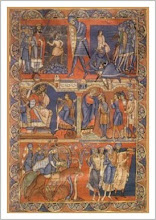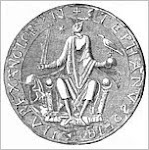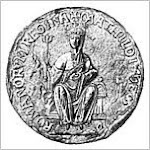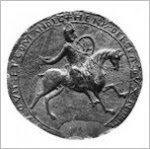17 August 2011
From the Anglo-Saxon Chronicle: 1154
A.D.1154. In this year died the King Stephen; and he was buried where his wife and his son were buried, at Faversham; which monastery they founded. When the king died, then was the earl beyond sea; but no man durst do other than good for the great fear of him. When he came to England, then was he received with great worship, and blessed to king in London on the Sunday before midwinter day. And there held he a full court. The same day that Martin, Abbot of Peterborough, should have gone thither, then sickened he, and died on the fourth day before the nones of
January; and the monks, within the day, chose another of themselves, whose name was William de Walteville, a good clerk, and good man, and well beloved of the king, and of all good men. And all the monks buried the abbot with high honours. And soon the newly chosen abbot, and the monks with him, went to Oxford to the king. And the king gave him the abbacy; and he proceeded soon afterwards to Peterborough; where he remained with the abbot, ere he came home. And the king was received with great worship at Peterborough, in full procession. And so he was also at Ramsey, and at Thorney, and at --- and at Spalding, and at ---
Notes:
This post concludes the material I have to share at this point in time but I hope you enjoy reading through it all. However, if something new should come to hand ...
until then Cheers for now!
16 August 2011
From the Anglo-Saxon Chronicle: 1140-53
A.D. 1140. In this year wished the King Stephen to take Robert,
Earl of Gloucester, the son of King Henry; but he could not, for
he was aware of it. After this, in the Lent, the sun and the day
darkened about the noon-tide of the day, when men were eating;
and they lighted candles to eat by. That was the thirteenth day
before the kalends of April. Men were very much struck with
wonder. Thereafter died William, Archbishop of Canterbury; and
the king made Theobald archbishop, who was Abbot of Bec. After
this waxed a very great war betwixt the king and Randolph, Earl
of Chester; not because he did not give him all that he could ask
him, as he did to all others; but ever the more he gave them, the
worse they were to him. The Earl held Lincoln against the king,
and took away from him all that he ought to have. And the king
went thither, and beset him and his brother William de Romare in
the castle. And the earl stole out, and went after Robert, Earl
of Glocester, and brought him thither with a large army. And
they fought strenuously on Candlemas day against their lord, and
took him; for his men forsook him and fled. And they led him to
Bristol, and there put him into prison in close quarters. Then
was all England stirred more than ere was, and all evil was in
the land. Afterwards came the daughter of King Henry, who had
been Empress of Germany, and now was Countess of Anjou. She came to London; but the people of London attempted to take her, and she fled, losing many of her followers. After this the Bishop of Winchester, Henry, the brother of King Stephen, spake with Earl Robert, and with the empress, and swore them oaths, "that he
never more would hold with the king, his brother," and cursed all
the men that held with him, and told them, that he would give
them up Winchester; and he caused them to come thither. When
they were therein, then came the king's queen with all her
strength, and beset them, so that there was great hunger therein.
When they could no longer hold out, then stole they out, and
fled; but those without were aware, and followed them, and took
Robert, Earl of Glocester, and led him to Rochester, and put him
there into prison; but the empress fled into a monastery. Then
went the wise men between the king's friends and the earl's
friends; and settled so that they should let the king out of
prison for the earl, and the earl for the king; and so they did.
After this settled the king and Earl Randolph at Stamford, and
swore oaths, and plighted their troth, that neither should betray
the other. But it availed nothing. For the king afterwards took
him at Northampton, through wicked counsel, and put him into
prison; and soon after he let him out again, through worse
counsel, on the condition that he swore by the crucifix, and
found hostages, that he would give up all his castles. Some he
gave up, and some gave he not up; and did then worse than he
otherwise would. Then was England very much divided. Some held
with the king, and some with the empress; for when the king was
in prison, the earls and the rich men supposed that he never more
would come out: and they settled with the empress, and brought
her into Oxford, and gave her the borough. When the king was
out, he heard of this, and took his force, and beset her in the
tower*. And they let her down in the night from the tower
by ropes. And she stole out, and fled, and went on foot to
Wallingford. Afterwards she went over sea; and those of Normandy turned all from the king to the Earl of Anjou; some willingly,and some against their will; for he beset them till they gave uptheir castles, and they had no help of the king. Then went Eustace, the king's son, to France, and took to wife the sister
of the King of France. He thought to obtain Normandy thereby;
but he sped little, and by good right; for he was an evil man.
Wherever he was, he did more evil than good; he robbed the lands,
and levied heavy guilds upon them. He brought his wife to
England, and put her into the castle at... Good woman she
was; but she had little bliss with him; and Christ would not that
he should long reign. He therefore soon died, and his mother
also. And the Earl of Anjou died; and his son Henry took to the
earldom. And the Queen of France parted from the king; and she
came to the young Earl Henry; and he took her to wife, and all
Poitou with her. Then went he with a large force into England,
and won some castles; and the king went against him with a much
larger force. Nevertheless, fought they not; but the archbishop
and the wise men went between them, and made this settlement:
That the king should be lord and king while he lived, and after
his day Henry should be king: that Henry should take him for a
father; and he him for a son: that peace and union should be
betwixt them, and in all England. This and the other provisions
that they made, swore the king and the earl to observe; and all
the bishops, and the earls, and the rich men. Then was the earl
received at Winchester, and at London, with great worship; and
all did him homage, and swore to keep the peace. And there was
soon so good a peace as never was there before. Then was the
king stronger than he ever was before. And the earl went over
sea; and all people loved him; for he did good justice, and made
peace.
Notes:
As you can see from reading through this entry in the chronicle, although dated for 1140, it covers all the years from 1140-53 in a very condensed form.
* The tower referred to is Oxford which was originally built by Robert D'Oyly. By this time, 1141/42, it was held by his nephew Robert D'Oyly, the son of Nigel D'Oyly.
15 August 2011
From the Anglo-Saxon Chronicle: 1135
A.D. 1135. In this year went the King Henry over sea at the
Lammas; and the next day, as he lay asleep on ship, the day
darkened over all lands, and the sun was all as it were a three
night old moon, and the stars about him at midday. Men were very
much astonished and terrified, and said that a great event should
come hereafter. So it did; for that same year was the king dead,
the next day after St. Andrew's mass-day, in Normandy. Then was
there soon tribulation in the land; for every man that might,
soon robbed another. Then his sons and his friends took his
body, and brought it to England, and buried it at Reading. A
good man he was; and there was great dread of him. No man durst
do wrong with another in his time. Peace he made for man and
beast. Whoso bare his burthen of gold and silver, durst no man
say ought to him but good. Meanwhile was his nephew come to
England, Stephen de Blois. He came to London, and the people of
London received him, and sent after the Archbishop William
Curboil, and hallowed him to king on midwinter day. In this
king's time was all dissention, and evil, and rapine; for against
him rose soon the rich men who were traitors; and first of all
Baldwin de Redvers, who held Exeter against him. But the king
beset it; and afterwards Baldwin accorded. Then took the others,
and held their castles against him; and David, King of Scotland,
took to Wessington against him. Nevertheless their messengers
passed between them; and they came together, and were settled,
but it availed little.
Notes:
1st August is Lammas Day, "the feast of first fruits". A blessing was performed annually in the church on the 1st or 6th of August. From this we can reasonably conclude that Henry I left for Normandy in early August.
St. Andrew's day is 30th November, dating Henry's death to 1st December.
Midwinter day is usually around 21st - 22nd December
Wessington is a village in the county of Derbyshire, England
12 August 2011
Stephen Meddles in Church Affairs
As already noted in previous blog entries Stephen's actions toward the clergy in England had dire consequences for his kingship particularly his treatment of Roger, Bishop of Salisbury in the year 1139. In addition, his appointment of Theobald of Bec as Archbishop of Canterbury caused further ill feeling between the king and his brother, Bishop Henry. We also know that the last few years of Stephen's reign were dominated by his unsuccessful attempts to have his son Eustace crowned his in own lifetime.
Two letters, one written by Bernard of Clairvaux in about 1140 and one by Pope Eugene III in 1147, provide further evidence of Stephen's sometimes awkward handling of church affairs. Both letters were addressed to his queen, Matilda of Bolougne, and both requested her intervention with the king.
The first letter concerned the appointment of William Fitzherbert to the See of York. He was a relative of Stephen's and the king had not only suggested his appointment but invested him after an election which was fiercely contested. This caused a long running dispute that continued for six years. During this episode Bernard also wrote a strongly worded letter to Stephen which appears to have gone unheeded.
The subject of the second letter was in regard to the episcopacy of London. Matilda, The Empress, had selected Robert de Sigillo and he had been canonically elected in 1141. After Stephen had been restored to his position as king he demanded an oath of fealty from Robert which he refused to give. Stephen persecuted him and in his letter the Pope urged the queen to intervene and persuade the king to accept a promise instead of the oath.
Two letters, one written by Bernard of Clairvaux in about 1140 and one by Pope Eugene III in 1147, provide further evidence of Stephen's sometimes awkward handling of church affairs. Both letters were addressed to his queen, Matilda of Bolougne, and both requested her intervention with the king.
The first letter concerned the appointment of William Fitzherbert to the See of York. He was a relative of Stephen's and the king had not only suggested his appointment but invested him after an election which was fiercely contested. This caused a long running dispute that continued for six years. During this episode Bernard also wrote a strongly worded letter to Stephen which appears to have gone unheeded.
The subject of the second letter was in regard to the episcopacy of London. Matilda, The Empress, had selected Robert de Sigillo and he had been canonically elected in 1141. After Stephen had been restored to his position as king he demanded an oath of fealty from Robert which he refused to give. Stephen persecuted him and in his letter the Pope urged the queen to intervene and persuade the king to accept a promise instead of the oath.
Subscribe to:
Comments (Atom)







